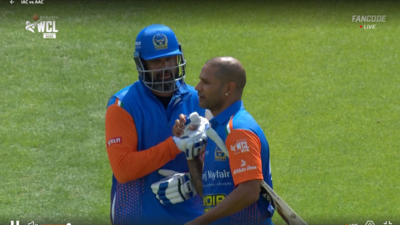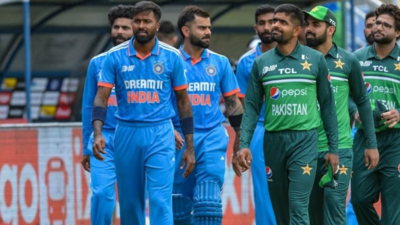The spectrum of antitrust lawsuits against the NCAA expanded this week when 19-year-old Ontario hockey player Rylan Masterson sued the NCAA and 10 universities in a New York federal court over a “boycott” of Canadian Hockey League players.
In a modern world where college athletes can earn millions of dollars through name, image and likeness deals and where former pro hockey players on European teams are eligible for Division I hockey, banning players who as teenagers earned modest amounts of money by playing in the CHL junior leagues seems antiquated and as ripe as ever for a legal challenge.
More from Sportico.com
Masterson, a defenseman who has recently played for the Fort Erie Meteors in the Greater Ontario Junior Hockey League, lost his NCAA eligibility in 2022 when he played two exhibition games for the OHL’s Windsor Spitfires, part of the CHL. CHL players are NCAA ineligible because they are deemed “professional athletes” and thus not amateurs.
Masterson is a high school graduate and would like to play D-I hockey, preferably at a college near his home in Ontario. The 10 universities named as defendants include Boston College, Boston University and Niagara University.
The underlying antitrust theory in Masterton v. NCAA is the same as the one used in O’Bannon, Alston, House and other lawsuits challenging amateurism rules. Masterson argues the NCAA and its member schools, which are competing businesses, have conspired to prevent how they compete for athletes. Those athletes, in turn, suffer financial and professional damage when would-be competitors agree to not compete or to compete less aggressively than the market would otherwise incentivize.
The NCAA rule disqualifying a hockey player who has played a CHL game is depicted as preventing “competition between the CHL and NCAA for top-end players.” This allegedly leads to a suppression of compensation for those players and places “16-year-olds in the impossible position of deciding, at that young age, whether they will ever want to play Division I hockey.” Fans and consumers also experience a form of harm since D-I hockey would be improved if CHL players could participate in it.
Masterson is represented by Richard A. Lafont and other attorneys from two law firms, Freedman Normand Friedland LLP and Berger Montague PC. The case has been assigned to U.S. District Judge Lawrence J. Vilardo, whose courtroom is in the Robert H. Jackson United States Courthouse in Buffalo, N.Y.
Masterson seeks for his lawsuit to be certified as a class action on behalf of anyone who played in the CHL from Aug. 12, 2020, to present or who attended college between Aug. 12, 2020, and the present after playing in the CHL. There are 60 teams in the three leagues (OHL, QMJHL and WHL) that make up the CHL, meaning the class, if certified, would include thousands of players. Masterson wants a court order that would bar the NCAA from applying the rule and for a jury to award money damages, which under antitrust law could be trebled.
The compensation of CHL players is important to the case since it goes to whether those players are “professional athletes.” Masterson stresses CHL players “do not receive a salary.” Instead, they receive of a stipend that is intended to cover living expenses—not a wage for labor, payment for NIL or other compensatory purpose—and is not more than $600 per month. Masterson further notes the stipend isn’t treated as income for purposes of taxes and is instead classified as an expense allowance.
Although there are several possible routes to the NHL, Masterson says CHL and D-I hockey teams “are the primary feeders” and provide players “with the best shot at making a career of playing hockey.” The complaint indicates that more than 50% of NHL players played in the CHL and about 30% played D-I hockey. Another route to the NHL is the United States Hockey League, another junior league, but Masterson says its quality of play “is consistently regarded as lower than in the CHL” and is more accurately viewed as a feeder for D-I.
Masterson’s complaint contends the NCAA’s ban of CHL players is nonsensical since the NCAA allows other pro hockey players to compete.
To that end, the complaint cites BU defenseman Tom Willander, whom the Vancouver Canucks selected with the 11th overall pick in the 2023 NHL Draft. Before suiting up for the Terriers, Willander was a professional hockey player in Sweden.
The complaint also mentions that USHL players, who are NCAA eligible, receive similar stipends to CHL players, and that the NCAA allows athletes in other sports to “receive significant compensation without losing their NCAA eligibility.” The complaint notes that tennis players can earn up to $10,000 a year without losing their eligibility and that other NCAA athletes, such as swimmers Katie Ledecky and Joseph Schooling, earned hundreds of thousands of dollars while retaining their eligibility.
The NCAA, Masterson asserts, has contemplated dropping the boycott but hasn’t done so. He mentions that in May, NCAA coaches held their annual meeting in Florida and discussed the legal concerns about the boycott but opted to not vote it out.
The NCAA will answer the complaint and seek its dismissal. Expect it to argue the rule advances amateurism goals related to distinguishing college athletes, who are also students, from pro athletes.
But that line of reasoning hasn’t worked in recent NCAA cases and appears especially vulnerable to rebuke in this situation.
“The boycott of CHL players makes little sense given the substantial NIL money earned by current college athletes, and the NCAA eligibility of players who have played professional hockey outside North America,” attorney and retired hockey player Jonathan Calla said in a phone interview.
In 1994-95, Calla tallied 103 points for the Cowichan Valley Capitals in the British Columbia Hockey League before the forward joined Northeastern University, where he continued his hockey career and education. He’s now a director at Goulston & Storrs in Boston and serves as outside general counsel for Winners Alliance, a global athlete-centric commercial solution to group licensing, and the Professional Women’s Hockey League.
Calla stressed the importance of providing optionality to young players and their families.
“Historically, elite teenage hockey players and their families have faced a decision resulting in, if the CHL is chosen, the forfeiture of the opportunity to earn a college scholarship and play D-I hockey at an NCAA school. Given the changes in college sports, a player for the OHL’s London Knights should be able to continue his hockey path at Boston University.”
Calla also believes removing the boycott would mean D-I hockey could feature better players.
“NCAA hockey will be more competitive with a greater pool of players to draw from, helping all players within NCAA hockey become NHL ready.
Best of Sportico.com







